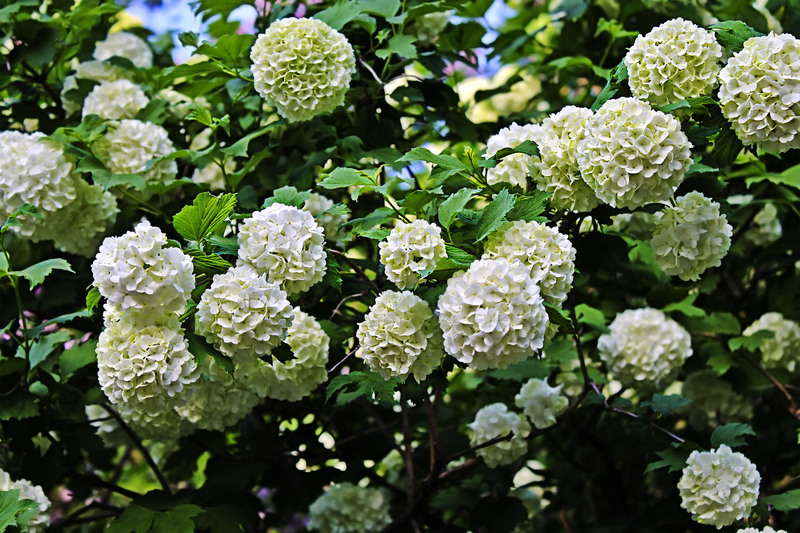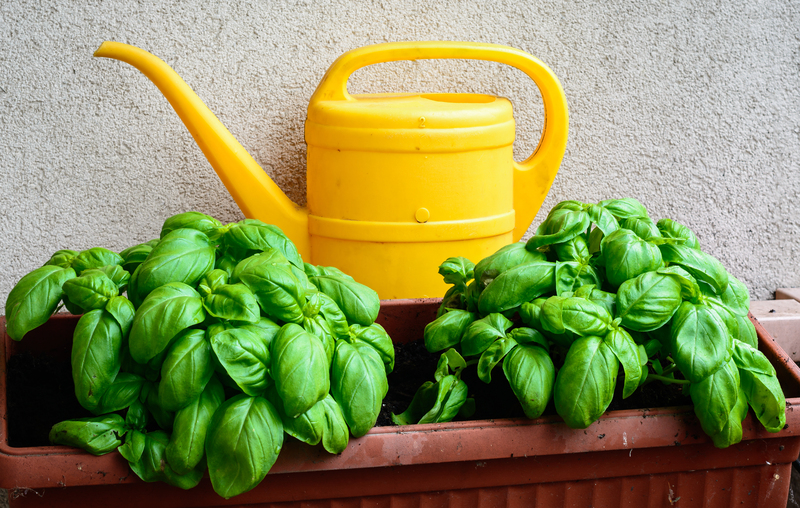Introduce yourself to the joys of herb gardening
Posted on 18/06/2025
Introduce Yourself to the Joys of Herb Gardening
If you've ever wished to add some fresh zest to your culinary creations, brighten your home with verdant foliage, or immerse yourself in a calming and productive hobby, now is the perfect time to introduce yourself to the joys of herb gardening. Whether you have a sprawling backyard, a small balcony, or only a sunny windowsill, herb gardening offers immense satisfaction, flavor, and beauty--no green thumb required!

Why Start an Herb Garden?
Herb gardening is more than just a trend--it's an enjoyable, rewarding, and surprisingly easy venture suitable for anyone. Let's dive into the multiple benefits that will excite gardeners of all experience levels:
- Fresh Flavors: Culinary herbs such as basil, parsley, rosemary, and mint will elevate your cooking with rich, fresh flavors that store-bought dried herbs simply can't compete with.
- Health Benefits: Many herbs are packed with vitamins, antioxidants, and anti-inflammatory properties that support a healthy lifestyle.
- Cost Savings: Grow your own herbs and save money by reducing trips to the grocery store for expensive bundle packs.
- Environmental Impact: Cultivating your own herbs reduces packaging waste and your carbon footprint.
- Therapeutic Value: Gardening, even on a small scale, is known to reduce stress, improve mood, and promote mindfulness.
- Aesthetic Appeal: Lush green leaves and fragrant blossoms can beautify your home both indoors and out.
Getting Started with Your Herb Garden
So, how do you get started with herb gardening? It's easier than you think! Here are essential steps to introduce yourself to growing herbs at home:
1. Choose Your Herbs Wisely
Begin by selecting herbs that suit your taste, lifestyle, and growing environment. Are you a lover of Italian cuisine? Consider basil, oregano, or parsley. Enjoy making herbal teas? Mint, chamomile, and lemongrass are fantastic starts.
- Basil: Essential for pestos and tomato-based dishes.
- Mint: Refreshing for drinks and desserts.
- Rosemary: Ideal for roasts and baked breads.
- Thyme: Adds earthy notes to soups and stews.
- Cilantro: A staple in Mexican and Asian cuisines.
- Chives: Perfect for salads, eggs, and garnishes.
Tip: Start with 3-5 herbs that you often use in your cooking or that have specific uses you wish to explore. This makes your herb garden more rewarding and manageable for a beginner.
2. Pick the Right Location
Most culinary herbs prefer at least 6 hours of sunlight per day, so finding a sunny spot is crucial. If you're gardening outdoors, look for a patch of well-draining soil with maximum daylight. For indoor growing, a south-facing window works best. No direct sunlight? No worries! Many herbs will thrive under fluorescent grow lights, perfect for apartments and homes with limited natural light.
3. Decide: Container or In-ground?
One of the joys of herb gardening is its adaptability. Here are your primary options:
- Container Herb Gardening: Great for patios, balconies, and indoor spaces. Containers allow for control over soil quality and prevent aggressive spreaders like mint from overtaking your garden.
- In-Ground Herb Beds: Best for those with more space. Garden beds enable you to grow a larger variety of herbs and companion plants together for attractive, productive displays.
Container tips: Choose pots with drainage holes to prevent soggy roots, and use high-quality potting soil mixed with a handful of compost.
4. Simple Steps to Plant Your First Herbs
- Fill your pots or garden bed with nutrient-rich, well-draining soil.
- Plant seeds or starter plants according to their recommended spacing and depth. Mint and oregano, for instance, spread quickly, so it's best to give them room.
- Water gently, keeping the soil moist but not waterlogged.
- Label your plants! Especially when young, herbs can be tricky to tell apart.
5. The Joy of Herb Garden Maintenance
Herb gardening is delightfully low-maintenance, yet a little care goes a long way. Here are some key tips to keep your herbs thriving:
- Water herbs when the top inch of soil is dry. Avoid overwatering as most herbs dislike soggy conditions.
- Pinch back and harvest leaves frequently. This encourages bushy growth and prevents bolting (premature flowering).
- Fertilize with an organic all-purpose feed every 4-6 weeks during the growing season for lush foliage.
- Watch for pests like aphids or powdery mildew, treating organically whenever possible.
Remember: The more you harvest (reasonably), the more your herbs will produce!
Discover the Diversity of Herb Gardening
Herb Gardens Indoors
Don't have outdoor space? Indoor herb gardening is a wonderful way to enjoy year-round freshness. On a windowsill, in a kitchen, or even as part of a hydroponic setup, herbs can be grown inside regardless of weather or season.
- Choose compact varieties like basil, chives, and thyme.
- Air circulation is crucial--avoid crowding pots together.
- Rotate pots weekly for even growth if light is coming from one direction.
Outdoor Herb Gardens
If you're blessed with a backyard or garden plot, outdoor herb gardening can be truly bountiful. Use raised beds, dedicated herb spirals, or mix herbs among your vegetables and ornamentals as attractive, functional edgings.
- Design formal knot gardens for a classic look, using low-growing herbs as borders.
- Allow perennial herbs like rosemary, sage, and oregano to establish long-lived, aromatic planting beds.
- Mix annual and perennial herbs for endless variety and interest.
Creative Herb Garden Ideas
Herb gardening isn't just about utility--it's about expression and fun! Here are some unique ways to enjoy herb gardening:
- Vertical Gardens: Use hanging pockets, stacked planters, or trellises to maximize your space and create living walls of flavor.
- Fairy Herb Gardens: Combine miniature herbs like thyme and creeping rosemary with fairy figurines for whimsical designs loved by kids and adults alike.
- Herb Wreaths: Craft living wreaths of hardy herbs like lavender and thyme for a beautiful, fragrant porch accent.
- Tea Gardens: Design a collection of soothing teas by grouping lemon balm, chamomile, mint, and sage for wellness blends.
Harvesting and Using Your Fresh Herbs
How and When to Harvest Herbs
It's a special moment when you pluck your first handful of basil or snip sprigs of thyme directly into your meal. Here's how to make the most of your herb harvest:
- Pick herbs in the morning after the dew dries for peak flavor and aroma.
- Use sharp scissors to cut leaves and stems. Always take less than a third of the plant at a time if you want it to keep producing.
- Basil, parsley, and cilantro can be cut often; woody herbs like rosemary or sage are slower to regrow and appreciate gentler harvesting.
Fresh Uses for Your Herb Bounty
- Cooking: Enhance dishes, make fresh pestos, or infuse oils and vinegars.
- Drinks: Add flavor and garnish to cocktails, lemonades, teas, or spa water.
- Health & Wellness: Create homemade salves, teas, and aromatherapy sachets for holistic well-being.
- Home Decor: Use herb bouquets or wreaths to beautify and freshen your home naturally.
Preserving Herbs All Year Round
When your garden is overflowing, it's easy to save herbs for later. Try these methods:
- Drying: Hang bundles in a dark, airy place, then store in jars for future use.
- Freezing: Chop and freeze herbs in oil or water in ice cube trays for quick soups and sautes.
- Infusing: Make herb-infused oils or vinegars to add zest to salad dressings and marinades.
Herb Gardening for Every Lifestyle
One of the greatest joys of herb gardening is its flexibility. You don't need to be a horticultural expert; with a little planning and love, anyone can succeed:
- Busy professionals or families with limited time? Choose low-maintenance perennials like thyme and oregano.
- Kids at home? Start with quick-growing, fun-to-harvest herbs like basil and mint that provide instant gratification.
- Urban dwellers? Compact pots and windowsill planters can fit into any apartment or condo.
- Gardeners with disabilities? Raised beds or tabletop containers make for easy, accessible gardening fun.
Tips for Herb Gardening Success
- Observe your plants daily--herbs "communicate" their needs with droopy leaves or color changes.
- Experiment with new flavors and uses as your confidence grows.
- Share seedlings and cuttings with friends and neighbors to build community through gardening.
- Join local or online gardening groups for advice, troubleshooting, and inspiration.
Common Herb Gardening Mistakes to Avoid
Even the most enthusiastic gardeners stumble sometimes. Watch out for these pitfalls:
- Overwatering: Most herbs prefer slightly dry soil--less is often more!
- Ignoring Light: Insufficient sunlight can lead to leggy, weak herbs.
- Crowding: Give each plant breathing space for healthy roots and leaves.
- Neglecting Harvest: Regular clipping keeps plants bushy and productive.

The Endless Joys of Herb Gardening Await You!
Introducing yourself to the simple joys of herb gardening opens up a world of flavor, beauty, health, and satisfaction. From the first green shoot in spring to the soothing aroma of a herbal tea on a winter night, your new garden will reward you in countless ways. Whether you're growing basil on your kitchen counter, crafting herbal gifts, or cultivating a backyard haven, herb gardening allows you to connect with nature and creativity every single day.
Get started now, and let your journey into the joys of cultivating homegrown herbs add fresh excitement to your meals, your home, and your life!
Frequently Asked Herb Gardening Questions (FAQs)
- How do I keep my indoor herbs alive? - Ensure plenty of light, don't overwater, and snip regularly to encourage healthy growth.
- Can I grow herbs from kitchen scraps? - Absolutely! Green onions, basil, and mint regrow easily from cuttings.
- What are the easiest herbs for beginners? - Start with basil, mint, chives, or thyme for reliable, fast results.
- Should I start with seeds or plants? - Seeds are less expensive but slower; starter plants are more forgiving for beginners.
Ready to Embrace Herb Gardening?
No matter your space or experience, introduce yourself to the joys of herb gardening and discover just how easy, delightful, and rewarding this green-thumb hobby can be. Plant a pot, tend a garden bed, or craft a living kitchen windowsill--with fresh herbs within reach, you'll bring flavor and wellness to every day.
Latest Posts
Defensive Gardening: Smart Steps to Protect Against Bad Weather
Container Gardening: Where Creativity and Nature Flourish Together
Fun and Safety: Designing a Child-Welcoming Garden

